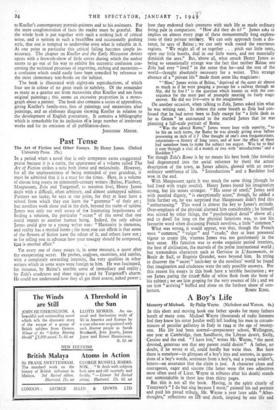Past Tense
IN a period when a novel that is only competent earns exaggerated praise because it is a -rarity, the appearance of a volume called The Art of Fiction strikes a note both ironic and melancholy. However, for all the unpleasantness of being reminded of past grandeur, it must be admitted that it is a tract for the times. Here, in a volume of eleven long essays on nineteenth-century writers (Balzac, Flaubert, Maupassant, Zola and Turgenieff, to mention five), Henry James deals with a difficult, often arbitrary, and almost unmapped subject. Painters are lucky, he says at one point, for they at least have a school from which they can learn the " grammar " of their art ; but novelists work alone and in the dark, beyond the realm of tuition. James was only too well aware of the frustrating hopelessness of finding a solution, the particular " secret " of the novel that one could impart to another human being. Indeed, the only advice James could give to a young writer was : " Humanity is immense, and reality has a myriad forms ; the most one can affirm is that some of the flowers of fiction have the odour of it, and others have not '
- as for telling you in advance how your nosegay should be composed, tiAt is another affair."
Yet every one of these essays is, in some measure, a quest after the exasperating secret. He probes, anglyses, examines, and cajoles, with a completely rewarding intensity, the very qualities in other writers which in some ways. were foreign to him. He was fascinated, for instance, by Balzac's terrible sense of immediacy and reality ; by Zola's crudeness and sheer vigour ; and by Turgenieff's charm. He could not understand how they all got their coarse, naked power ;
how_they endowed their creatures with such life as made ordinary living pale in comparison: " How did they do it? " James asks or
implies on almost every page of these monumentally long explora- tions of their private territory. We can only approach from a dis- tance, he says of Balzac ; we can only walk round the enormous regions. " We might all of us together . . . pitch our little tents,
open our little booths, deal in our little wares, and not materially diminish the area." But,4above all, what struck Henry James as
being so sensationally strange was the fact that neither Balzac nor Zola had ever " lived " in the sense that he—and the rest of the world—thought absolutely necessary for a writer. This strange absence of a " private life " made them seem like magicians :
" 'How,' James writes of Balzac, ' deprived of the outer air almost as much as if he were gouging a passage for a railway through an Alp, did he live ? ' is the question which haunts us with the con- sequence for the most part of promptly meeting its fairly tragic answer. He did not live—save in the imagination."
On another occasion, when talking to Zola, James asked him what he was writing next. In almost the same breath as Zola had con- fessed that he had never been to Italy except for " a little dash as far as Genoa " he announced to the startled James that he was planning a full-scale portrait of Rome.
"Was the adored Rome," James wrote later with asperity, " to be his on such terms, the Rome he was already giving away before
possessing an inch of it ? One thought of one's own frequentation, saturations—a history of long years, and of how the effect of, them had somehow been to make the subject too august. Was he to find it easy Through a visit of a month or two with ' introductions' and a Baedeker ? "
Yet though Zola's Rome is by no means his best book (the novelist had degenerated into the social reformer by then) the actual
description of the town, as James admits, glowed with an extra- ordinary semblance of life. " Introductions " and a Baedeker had won in the end. With Maupassant again it was much the same thing (though he had lived with tragic results). Henry James found his imagination strong, but his senses stronger. "His sense of smell," James said
with puzzled dignity, " is exceptionally acute," though, be added a little further on, he was surprised that. Maupassant didn't find this
"embarrassing." This word is almost the key to James's attitude. Over-emphasis of the physical alarmed him considerably ; he himself was stirred by other things, the " psychological detail " above all ; and to dwell for long on the physical functions was, to use his favourite word when discussing French novelists, a little " common." What was wrong, it would appear, was that, though the French were " common," " vulgar" and " crude," they at least possessed vigour to create life, whereas James was too gentlemanly in the best sense. His function was to evoke exquisite period interiors, the best of civilisation, the marvels of the polite international world ;
but tremendous characters such as Gervaise in L'Assommoir, or
Boule de Suif, or Eugenie Grander, were beyond him. In trying to discover the " secret " latch-key to the novelists' world he found that imagination and crudeness were the only possible answers. For this reason his essays in this book have a terrible fascination ; we see James paring the tiniest flake of white flesh from the bone of his subject ; we see him groping for the very essence of life ; and we see him " arriving " baffled and alone on the farthest shore of con-






































 Previous page
Previous page